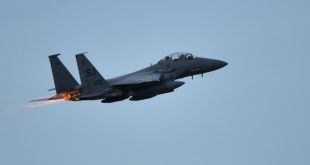Today for the right to control the middle East is a real fight. The actions of the Russian Federation HQs in Syria, the most convincing way show that Russia is one of the leading participants in that struggle. Rivals are many, and each has its own purposes.

Control over the Middle East is a key strategic point of the modern global position — for Russia and the USA in a state of sharp geopolitical conflict, is a stunning victory over an opponent.
The European Union pursues less ambitious goals. He is interested in a regular supply of energy at reasonable prices and the settlement of the refugee situation, tearing the social fabric of the European body. Therefore, the EU and individual countries in the region subordinate to the U.S. role in the European strategic interests and their political and military autonomy in the protection of those interests in place.
As USA are not able to provide EU guarantees of these terms, the EU policy in the region becomes more independent (Merkel clearly flirts with Erdogan), but at the same time less intelligible and coherent, oriented to solve strategic and current problems.
Such participants, as Saudi Arabia, Turkey or Iran, being a powerful regional players, at the same time depend on the global players, both in terms of its international positioning, and the overall military-political scenario of the region.
Roughly speaking, the presence of the military and political umbrella provided by superpower, immediately gives the country an advantage over regional opponents.
For a long time Turkey and Saudi Arabia, as partners and allies of the United States, had the relevant umbrella and determined political layout in the region without regard to Iran. Tehran could respond to indirect actions (for example, using Hezbollah, supplying weapons and sending instructors to their allies, the placement of missile batteries on the shore of the Strait of Hormuz, etc.). But it was clear that any open conflict he would lose.
Over the past year the situation has changed in a most dramatic way. First, with Iran were lifted UN sanctions. This allowed him not only to return to the market of hydrocarbons, but also to resume military-technical cooperation with Russia.
Secondly, Iran and Russia were military allies in Syria. It objectively strengthened the military security of Iran. As the ally of Russia, he already gets air defense system s-300 and can count on the fact that in a critical situation Russia will cover it from direct aggression of a superpower.
Thirdly, Turkey and Saudi Arabia in the region has ceased to keep pace with the rapidly changing American interests. Ankara and Riyadh are increasingly in conflict with Washington. In principle cases (Yemen, Syria) in direct military support of the USA denied.
Thus, Russia’s allies — Syria and Iran — have the opportunity to purchase in the middle East the same weight and importance that have recently had U.S. allies — Turkey and Saudi Arabia.
As practice shows, the rest of the region mainly to build relationships with controlling the middle East superpower through its local allies. Only Israel and Egypt have built with Washington and Moscow relations directly, but they take into account the General situation in the region.
It is clear that today while fighting in Syria continues, speaking about a final military victory for the Russian allies early. It is planned, coming, becomes palpable, hanging thick in the air. But she had not yet taken place. And in war, any possible accident.
Nevertheless, the overall political situation (in which the US rejected the Turkey as in their own support and the support of NATO in case of introduction of troops to Syria start and for that reason a military conflict with Russia, and also left Saudi Arabia alone with receiving support from Iran to the Yemeni Houthis, confidently winning the guerrilla war in the army of the Kingdom) shows that Saudi Arabia and Turkey as major regional players written off the USA. Washington is looking for a new partners, in particular flirting with the Kurds.
Characteristically, in a similar way events develop in the economic sphere. Namely, in principle for the region trade in oil.
A year ago, Saudi Arabia has steadily increased its oil production despite falling world prices and insistence of OPEC to reduce the supply of oil on the market to raise prices. Experts have even started to argue, attempting Riyadh to bury Russia’s oil industry or under the guise swung and American.
However, the US generally supported the decline in oil prices. As a result, prices dropped to the level when it already started to shake the economy of Saudi Arabia. The Kingdom was forced to resort to borrowing on global financial markets to balance totally depending on the oil budget. Providing relative internal stability of social expenditures of the state and the costs of the rival branches of the Royal family started to wind down.
Significantly stronger and more diversified the Russian and American economies experienced a fall in oil prices without much pleasure, but without the enormous shocks.
However, recent reports from the USA indicate that further declines in prices or even just keeping them at current levels could derail the American economy into a crisis worse than the great depression within the next year. That is, neither the U.S. nor Saudi Arabia can no longer play on the decline in oil prices.
On this background the Russian oil companies warn that will maintain profitability even at 10 dollars per barrel, and fiscal (including budgetary) problems of the Russian Federation arising from foregone oil revenues, partially covered by reserves, partly due to positive foreign trade balance. In General, Russia could face difficulties, but not catastrophe (unlike friends and partners).
It is not surprising that Moscow calmly takes the growth in Iranian oil production (700 thousand barrels per day) and trade on the world market (500 thousand barrels per day). The official position announced by Minister of energy of the Russian Federation, is that the freezing of oil production is possible without Iran.
In other words, American allies who are suffering serious financial and economic problems due to low oil prices, will reduce production, and the Russian ally will increase. This is exactly what the U.S. and Saudi Arabia has offered the world a couple of years ago, only in reverse. In the version of Washington and Riyadh, the whole world could, if wanted, to cut production, but the United States and the Kingdom was going to increase.
Now the boomerang has returned.
Rostislav Ishchenko







